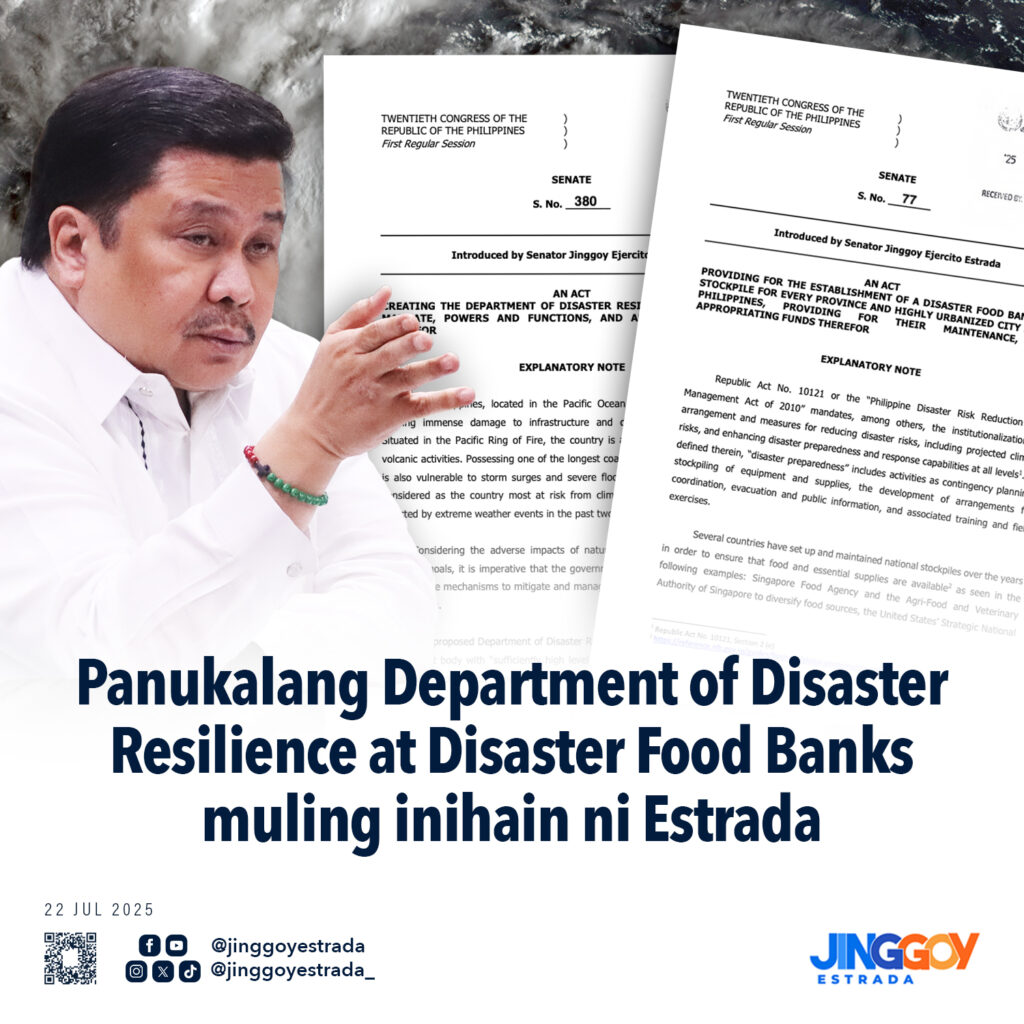BUILDING on the gains from the enactment of the “Ligtas Pinoy Centers Act,” Senate President Pro Tempore Jinggoy Ejercito Estrada has introduced twin measures to chart a broader disaster-ready blueprint for the country — landmark legislations that seek to revolutionize the Philippines’ disaster preparedness and response system.
Among Estrada’s pet bills for the 20th Congress is the creation of a Department of Disaster Resilience (DDR) — an agency that will unify, strengthen, and streamline disaster preparedness, response, and recovery efforts — as well as the enactment of the Disaster Food Bank and Stockpile Act, which seeks to establish a nationwide network of food banks and relief supplies for swift deployment during emergencies.
“Disaster resilience begins long before the typhoon hits or the ground shakes. It starts with smart planning, readiness, and rapid response capabilities. These two proposed laws aim to address the gaps that often lead to avoidable loss of lives, hunger, and delayed recovery,” said Estrada.
Under the proposed Disaster Resilience Act, the DDR will be the primary government agency responsible for disaster risk reduction and management (DRRM), climate adaptation, emergency response, and long-term recovery.
The DDR will lead in preparing, coordinating, and implementing national and local disaster resilience efforts, and will be equipped with the authority, technical know-how, and resources to respond decisively. It will cover all natural and biological hazards, including typhoons, earthquakes, pandemics, volcanic eruptions, and other climate-related threats.
Also, among the DDR’s key responsibilities are conducting risk assessments, building compliant evacuation centers, leading disaster recovery efforts, and developing early warning systems. It will likewise be tasked with coordinating with local governments, national agencies, and international partners, while providing timely support and information to affected communities.
“Given how natural disasters can seriously affect our country’s economic progress, it’s important for the government to put in place long-term strategies and practical solutions to manage risks and help communities become less vulnerable,” Estrada said.
Alongside the creation of DDR, the veteran lawmaker is giving his proposed Disaster Food Bank and Stockpile Act another push.
Initially filed in the 19th Congress, the measure seeks to establish food and supply hubs in every province and highly urbanized city to ensure quick and effective delivery of aid during crises.
“Relief efforts are often delayed because of access issues. These food banks will bring help closer to those who need it most, especially in hard-to-reach and island communities,” Estrada said.
The local stockpiles will include non-perishable food, potable water, medical supplies, first-aid kits, power and light sources, tents, and communication devices. Warehouses will be calamity-proof, secure, and jointly managed by the National Disaster Risk Reduction and Management Council (NDRRMC) and the Department of Social Welfare and Development (DSWD).
“These food banks can spell the difference between life and death when disaster strikes,” said Estrada.
The bill also requires stored items to have a minimum shelf life of two years, enough supplies to be maintained to support the local population for at least three weeks, and a first-in, first-out system be used to ensure timely use and replenishment of expiring goods. It also prioritizes implementation in island municipalities, 4th to 5th class LGUs, and hard-to-reach areas.
Both proposals reflect Estrada’s broader vision of a proactive, well-coordinated, and inclusive disaster governance system — one that harnesses science, community participation, and inter-agency collaboration to protect lives and build a culture of preparedness.
“Our people deserve a government that is ready not just to respond, but to anticipate and act. With the creation of the Department of Disaster Resilience and the establishment of local food banks, we can ensure that no Filipino is left behind in times of need,” Estrada said.
As the chairperson of the Senate Committee on National Defense and Security, Estrada shepherded the passage of Republic Act No. 12076 or the “Ligtas Pinoy Centers Act,” a landmark measure establishing a network of permanent, storm-resilient evacuation centers nationwide.


